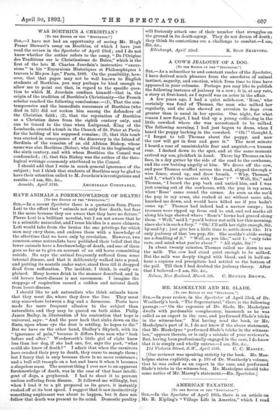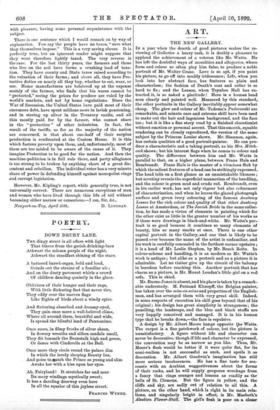AMERICAN TAXATION.
[TO THE EDITOR OF THE " SPECTATOR."]
SIR,—In the Spectator of April 16th, there is an article on Mr. R. Kipling's " Village Life in America," which I read
with pleasure, having some personal acquaintance with the subject.
There is one sentence which I would remark on by way of explanation. You say the people have no taxes, " save what they themselves impose." This is a very saving clause. It is perfectly true, but an ignorant reader might suppose that they were therefore lightly taxed. The very reverse is the case. For the last thirty years, the farmers and those who live on the soil have borne a crushing load of taxa- tion. They have county and State taxes raised according to the valuation of their farms ; and above all, they have Pro- tective duties on nearly all they buy, whether to eat, wear, or use. Home manufactures are bolstered up at the expense mainly of the farmer, who finds that his wares cannot be "protected," seeing the prices for produce are ruled by the world's markets, and not by home regulations. Since the War of Secession, the United States have paid most of their enormous debt, have spent millions more in lavish pensioning, and in storing up silver in the Treasury vaults, and all this mostly paid for by the farmer, who cannot share in , the " protection " of other industries. In fact, the result of the tariffs, so far as the majority of the nation are concerned, is that about one-half of their surplus production is confiscated at the Custom House. It is this which fastens poverty upon them, and, unfortunately, most of them are too misled to be aware of the cause of it. They imagine Protection to be good for the nation. And then the machine-politician is in full rule there, and party allegiance is too strong to be broken by anything short of a great dis- content and rebellion. The individual voter has a very minute share of power in defending himself against monopolist rings and corrupt legislation.
However, Mr. Kipling's report, while generally true, is not universally correct. There are numerous exceptions of men and women who have lived through this life of toil without becoming either narrow or censorious.—I am, Sir, &c.,



















































 Previous page
Previous page